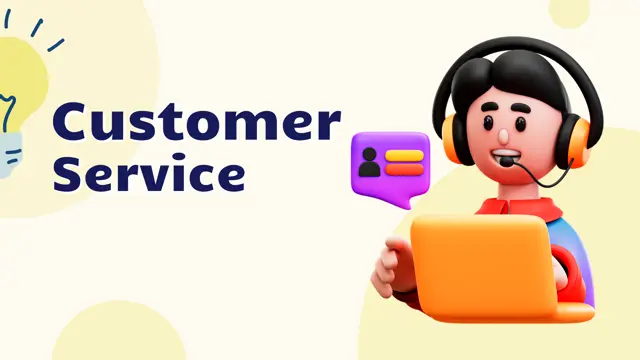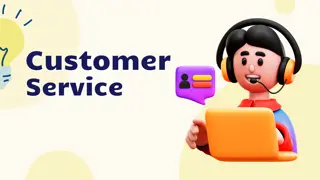
Communication & Customer Service
CPD Certified| Free PDF Certificate | Lifetime Access | Learner Support | No Hidden Fees | 100% Success Rate
EDURISE
Summary
- Reed Courses Certificate of Completion - Free
- Tutor is available to students
Add to basket or enquire
Overview
In today's competitive business landscape, exceptional customer service is no longer a luxury but a necessity. Let's explore the compelling data-driven reasons why pursuing a career in Customer Service can be a game-changer.
1. Thriving Business Demand
- Market Growth: The global customer service software market is projected to reach $66.8 billion by 2027, driven by businesses prioritizing customer satisfaction. (Source: Grand View Research)
- Customer Loyalty: 86% of customers are willing to pay more for a better customer experience. (Source: PwC)
- Competitive Edge: Companies delivering superior customer service outperform their competitors by 80%. (Source: HubSpot)
2. Robust Career Opportunities
- Growing Job Market: The U.S. Bureau of Labor Statistics projects a 9% growth in customer service representative jobs, with over 430,000 new positions by 2030.
- Diverse Career Paths: Customer service skills open doors to various roles, including Customer Service Manager, Sales Representative, and even positions in marketing, HR, and operations.
- Global Demand: Customer service skills are universally valued, making them transferable across industries and countries.
3. Business Impact of Exceptional Customer Service
- Revenue Growth: Businesses that excel in customer service see an average revenue increase of 4-8%. (Source: Bain & Company)
- Customer Retention: It costs five times more to acquire a new customer than to retain an existing one. Exceptional service ensures customer loyalty. (Source: Lee Resources)
- Positive Reputation: Good customer service builds a positive brand image, leading to customer referrals and increased market share.
4. Skills for Life and Career
- Communication: Master effective communication techniques, enhancing your ability to connect with people in all aspects of life.
- Problem Solving: Develop strong problem-solving skills that are valuable not only in business but also in personal life.
- Empathy and Emotional Intelligence: Understand and connect with people on a deeper level, fostering better relationships and conflict resolution.
5. Course Benefits
- Comprehensive Learning: Our Customer Service course covers a wide range of topics, from active listening to handling difficult customers, equipping you with practical skills.
- Career Support: Gain access to job placement assistance and interview coaching to secure your dream job in customer service.
The demand for exceptional customer service skills continues to rise, creating countless opportunities for career growth and success. By enrolling in our Customer Service course, you'll not only acquire essential skills but also position yourself as a valuable asset in any industry. Elevate your career and contribute to business success by mastering the art of exceptional customer service.
Curriculum
Course media
Description
Learning Outcomes:
1. Grasp the Fundamentals of Customer Service and CRM
- After completing Module 1, students will have a solid understanding of the core principles of customer service and customer relationship management (CRM). They will recognize the importance of customer-centric strategies in business.
2. Master Effective Customer Service Techniques and Strategies
- By the end of Module 2, participants will be proficient in a wide range of customer service techniques and strategies. They will learn how to engage with customers, handle inquiries, and resolve issues while exceeding customer expectations.
3. Utilize Customer Relationship Management (CRM) Systems Effectively
- Upon finishing Module 3, learners will be capable of navigating and leveraging CRM systems to maintain and enhance customer relationships. They will know how to use CRM data to improve customer interactions.
4. Evaluate Customer Service Performance Using Metrics
- After Module 4, students will possess the ability to measure customer service performance accurately. They will understand key metrics, analyze data, and make data-driven decisions to enhance service quality.
5. Foster a Customer-Centric Culture and Navigate Digital Channels
- Following Modules 5 and 6, participants will be equipped with the skills to create a customer service culture that fosters success. They will also understand the nuances of providing customer service in the digital age, including social media and online channels.
Module 1: Introduction to Customer Service & CRM
- Description: This module introduces students to the fundamentals of customer service and customer relationship management (CRM). It covers the importance of customer-centric strategies, the evolution of customer service, and the role of CRM systems in maintaining strong customer relationships.
Module 2: Customer Service Techniques and Strategies
- Description: Module 2 dives deep into effective customer service techniques and strategies. Students will learn how to communicate with customers, manage inquiries and complaints, and deliver exceptional service. Real-world scenarios and case studies provide practical insights into customer interactions.
Module 3: Customer Relationship Management (CRM) Systems
- Description: In this module, participants explore the world of CRM systems. They will gain hands-on experience in navigating and utilizing CRM software to manage customer information, track interactions, and enhance customer relationships. The module emphasizes the importance of data-driven decision-making.
Module 4: Customer Service Metrics and Performance Evaluation
- Description: Module 4 focuses on measuring and evaluating customer service performance. Students will become proficient in using key metrics to assess service quality, customer satisfaction, and employee performance. They will also learn to analyze data for continuous improvement.
Module 5: Creating a Customer Service Culture for Success
- Description: This module delves into the importance of fostering a customer-centric culture within organizations. Students will explore strategies for aligning the entire team with customer service goals and values to create a culture that leads to long-term success.
Module 6: Customer Service in a Digital Age
- Description: Module 6 addresses the unique challenges and opportunities of providing customer service in the digital age. Students will learn to navigate digital channels, including social media and online platforms, to engage with customers effectively and manage their online reputation.
Module 7: Handling Difficult Customer Situations
- Description: In the final module, students will acquire essential skills for handling challenging customer situations. They will learn de-escalation techniques, conflict resolution strategies, and how to turn dissatisfied customers into loyal advocates through effective problem-solving and empathy.
Who is this course for?
The ideal audience or target traffic for this Customer Service course can be identified based on the curriculum's content and objectives. Here's a breakdown of the appropriate audience:
- Customer Service Representatives: This course is tailor-made for individuals working in customer service roles, including frontline customer service agents and representatives. They can enhance their existing skills and learn new techniques to excel in their roles.
- Customer Service Managers and Supervisors: Customer service managers and supervisors can benefit from this course to refine their leadership skills, implement CRM systems effectively, and establish a customer-centric culture within their teams.
- Sales and Marketing Professionals: Sales and marketing professionals looking to improve customer interactions, deepen client relationships, and boost customer loyalty will find value in this course, especially in Modules 2, 3, and 5.
- Business Owners and Entrepreneurs: Entrepreneurs and small business owners can learn how to provide exceptional customer service, implement cost-effective CRM systems, and create a customer-focused culture that sets them apart from competitors.
- CRM Administrators and Analysts: Professionals responsible for managing CRM systems can gain in-depth knowledge in Module 3, enabling them to optimize CRM software for better customer relationship management.
- Human Resources Professionals: HR professionals can benefit from Modules 5 and 7, which cover creating a customer-centric culture and handling difficult customer situations. These skills are valuable for improving internal customer service and resolving workplace conflicts.
- Marketing Managers: Marketing managers can apply the knowledge gained in Module 6 to understand the role of digital channels in customer service, enhancing their ability to create effective digital marketing strategies.
- Consultants and Business Advisers: Consultants and advisers can use this course to broaden their expertise in customer service and CRM, offering valuable insights and guidance to their clients.
- Job Seekers and Career Changers: Individuals looking to enter customer service or related roles can use this course to acquire the foundational knowledge and skills needed to launch a successful career in customer service.
- Mid-level Managers in Various Industries: Mid-level managers from different industries can leverage the course to develop a holistic understanding of customer service and CRM, helping them contribute to overall business success.
In summary, this course caters to a broad audience, including current customer service professionals, managers, entrepreneurs, and individuals looking to enter the customer service field. It provides a well-rounded education in customer service, CRM, and digital customer interactions, making it valuable for a variety of career paths and industries.
Requirements
The Customer Service has no formal entry requirements.
Career path
- Earn an average salary ranging from £18,000 to £28,000 per year in the UK, with opportunities for growth based on experience and performance.
- Progress to a managerial role with salaries between £25,000 and £45,000 annually, with potential bonuses and benefits.
- Manage CRM systems and earn an average annual salary of £28,000 to £40,000, depending on experience and organization size.
Questions and answers
Currently there are no Q&As for this course. Be the first to ask a question.
Certificates
Reed Courses Certificate of Completion
Digital certificate - Included
Will be downloadable when all lectures have been completed.
Reviews
Currently there are no reviews for this course. Be the first to leave a review.
Legal information
This course is advertised on reed.co.uk by the Course Provider, whose terms and conditions apply. Purchases are made directly from the Course Provider, and as such, content and materials are supplied by the Course Provider directly. Reed is acting as agent and not reseller in relation to this course. Reed's only responsibility is to facilitate your payment for the course. It is your responsibility to review and agree to the Course Provider's terms and conditions and satisfy yourself as to the suitability of the course you intend to purchase. Reed will not have any responsibility for the content of the course and/or associated materials.


